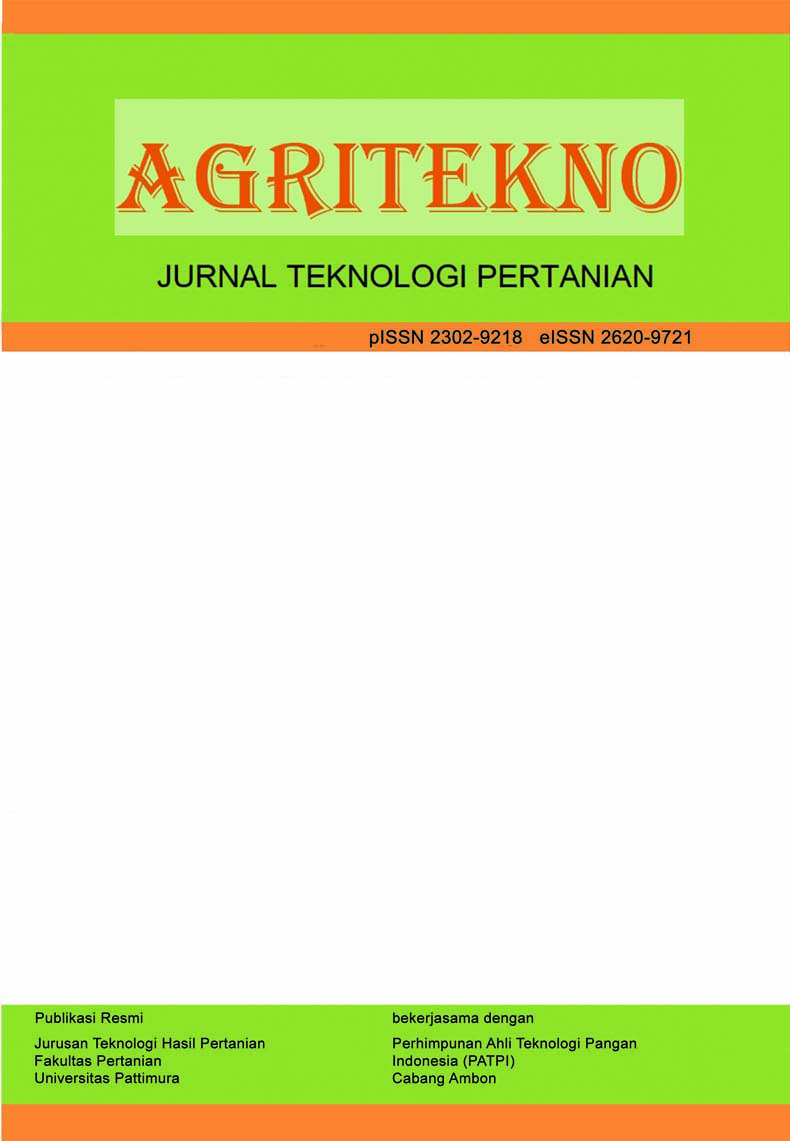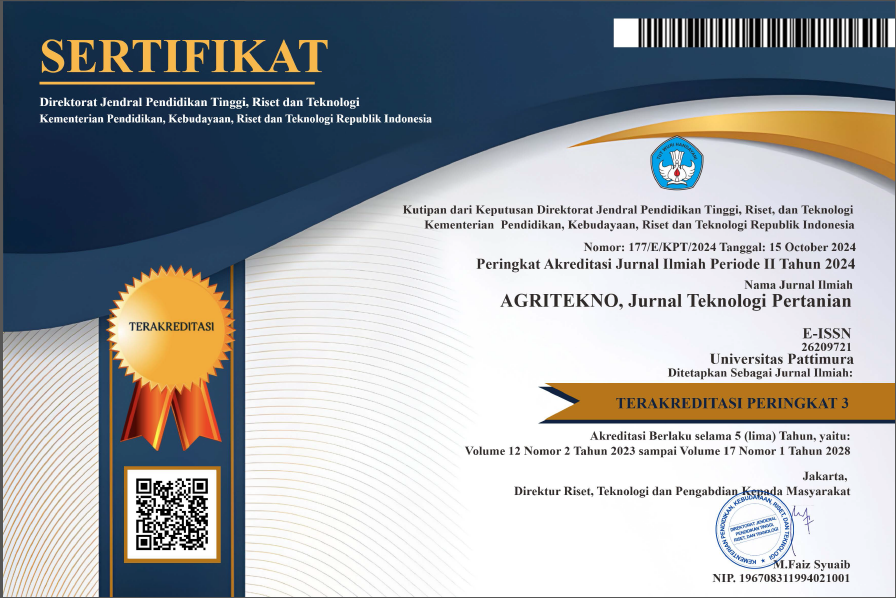Karakteristik Kimia, Viskositas, dan Sensori Yoghurt Instan Berbahan Labu Kuning dengan Variasi Konsentrasi Tepung Porang
Chemical, Viscosity and Sensory Characteristics of Instant Yogurt Based on Pumpkin with Variety of Konjac Powder Concentration
Abstract
Pumpkin is a rich source of dietary fiber and provitamin A, particularly β-carotene, and has potential for development into functional food products such as instant yoghurt. However, a thickening agent is required to enhance the texture and stability of the product. Porang flour, which contains a high concentration of glucomannan, can function effectively as natural thickener, binder, and substitute for commonly used gelling agents such as agar and gelatin. The research aimed to improve the chemical quality, viscosity and sensory properties of pumpkin yoghurt powder with differebt concentration of porang flour. The experimental procedure involved preparing pumpkin juice, fermenting it into yoghurt with porang flour added at varying concentrations (0.1%, 0.2%, 0.3%, and 0.4%), followed by instantization using the foam-mat drying The resulting products were analyzed for pH, moisture content, antioxidant activity, viscosity, and sensory properties. The results showed that the addition of porang flour significantly influenced all evaluated parameters. Including viscosity, pH, moisture content, antioxidant activity and sensory characteristics. The formulation containing 0.3% porang flour demonstrated the most favorable combination of physicochemical and sensory properties, indicating its potential as the optimal concentration for producing high-quality instant pumpkin yoghurt powder.
Downloads
References
Adrianto, R., Wiraputra, D., Jyoti, M.D., & Andaningrum, A.Z. (2020). Total bakteri asam laktat, total asam, nilai ph, sineresis, total padatan terlarut dan sifat organoleptik yoghurt metode back slooping. Jurnal AgriTechno, 13(2), 105-111. https://doi.org/10.20956/at.v13i2.358
Belitz, H.D. & Grosch, W. (2005). Food Chemistry. Eds. 5. Springer Verlag, Berlin. https://link.springer.com/article/10.1007/s00216-004-3036-9.
BPS (2024). Data Produksi Tanaman Semusim. Badan Pusat Statistik Jakarta. https://www.bps.go.id/id/statisticstable/3/VFV4MmQxaG9kakZrVUdWeEx6aDFUMnN6WmpocVp6MDkjMw==/produksi-tanaman-sayuran-dan-buahbuahan-semusim-menurut-jenis-tanaman--2021.html?year=2021.
Febrianto, A., Kumalaningsih, S. & Aswari, A.W. (2012). Process engineering of drying milk powder with foam-mat drying method. a study on the effect of the concentration and types of filler. Journal of Basic and Applied Scientific Research, 2(4), 3588-3591.
Hawa, L.T., Thohari, I., & Eka, L. (2013). Pengaruh pemanfaatan jenis dan konsentrasi lipid terhadap sifat fisik edible film komposit whey-porang. Jurnal Ilmu-ilmu Peternakan, 23(1), 35-43. https://jiip.ub.ac.id/index.php/jiip/article/view/144/183.
Jannah, A.M., Legowo, A.M., Pramono, Y.B., & Al-baarri, A.N. (2014). Total bakteri asam laktat, ph, keasaman, citarasa dan kesukaan yogurt drink dengan penambahan ekstrak buah belimbing. Aplikasi Teknologi Pangan, 3(2), 7–11.
Jannah, Y.R., Thohari, I., & Purwadi. (2013). The addition of porang flour (Amorphophallus oncophillus) in the yogurt ice cream on total plate count, texture, taste, aroma, total solid and pH. [Skripsi]. Malang: Universitas Brawijaya. https://repository.ub.ac.id/id/eprint/136881/.
Kim, M.Y., Kim, E.J., Kim, Y.N., Choi, C., & Lee, B.H. (2012). Comparison of the chemical compositions and nutritive values of various pumpkin (Cucurbitaceae) species and parts. Nutrition Research and Practice, 6(1), 21-27. https://doi.org/10.4162/nrp.2012.6.1.21
Kulczynski, B. & G. Michałowska, A. (2019). The profile of secondary metabolites and other bioactive compounds in Cucurbita pepo L. and Cucurbita moschata pumpkin cultivars. Molecules, 24(2945), 1- 22. https://doi.org/10.3390/molecules24162945
Khusuma, B.A.D., Aminah, S., & Hersoelistyorini, W. (2022). Aktivitas antioksidan, karakteristik fisik, dan sensoris yogurt beku kecambah kacang merah dengan variasi penambahan ekstrak kulit buah naga merah. Jurnal Pangan dan Gizi, 12(1), 32-40. https://doi.org/10.26714/jpg.12.1.2022.32-40
Mayasari, E., Harahap, Y.W., & Rahayuni, T. (2023). Aplikasi pengeringan foam-mat dengan kombinasi tween 80 dan maltodekstrin pada pembuatan bubuk daun kesum (Polygonum minus Huds.). Pro Food, 9(1), 68-75. https://doi.org/10.29303/profood.v9i1.290
Nurrahman, & Astuti, R. (2022). Analisis komposisi zat gizi dan antioksidan beberapa varietas labu kuning (Cucurbita moschata Durch). Agrointek: Jurnal Teknologi Industri Pertanian, 16(4), 551-559. https://doi.org/10.21107/agrointek.v16i4.12336.
Pramitasari, D., Anandhito, R.B.K., & Fauza, G. (2011). Penambahan ekstrak jahe (Zinger officinale Rose.) dalam pembuatan susu kedelai bubuk instan dengan metode spray drying: Komposisi kimia, sifat sensori dan aktivitas antioksidan. Biofarmasi, 9(1), 17-25. https://doi.org/10.13057/biofar/f090104.
Rasbawati, I., Novieta, I.D., & Nurmiati. (2019). Karakteristik organoleptik dan nilai pH yoghurt dengan penambahan sari buah mengkudu (Morinda citrifolia L.). Jurnal Ilmu Produksi dan Teknologi Hasil Peternakan, 7(1), 41–46. https://journal.ipb.ac.id/index.php/ipthp/article/view/25041/16279.
Rasdianah, N., Papeo, D.R.P., Thomas, N.A., Latif, M.S., & Suleman, W.R. (2024). Pembuatan yogurt dari labu kuning (Cucurbita moschata) sebagai minuman kesehatan. Jurnal Farmasi Teknologi Sediaan Dan Kosmetika, 1(2), 64-71. https://doi.org/10.70075/jftsk.v1i2.22
Rohman, E., & Maharani, S. (2020). Peranan warna, viskositas, dan sineresis terhadap produk yoghurt. Edufortech, 5(2), 97-107. https://doi.org/10.17509/edufortech.v5i2.28812
Sawitri, M.E., Manab, A., & Palupi, T.W.L. (2008). The study on gelatine addition to acidity, pH, water holding capacity and syneresis of yogurt. Jurnal Ilmu dan Teknologi Hasil Ternak, 3(1), 35-42. https://jitek.ub.ac.id/index.php/jitek/article/view/123/119.
Sampurno, A., Cahyanti, A.N., & Nofiyanto, E. (2020). Characteristics of goat's milk yoghurt based jackfruit and cempedak. Jurnal Pengembangan Rekayasa dan Teknologi, 16(2), 121-128. https://doi.org/10.26623/jprt.v15i2.1644
Syainah, E.S., Novita & Yanti, R. (2014). Kajian pembuatan yoghurt dari berbagai jenis susu dan inkubasi yang berbeda terhadap mutu dan daya terima. Jurnal Skala Kesehatan, 5(1), 1-8. https://doi.org/10.31964/jsk.v5i1.10
Tatirat, O., Charunuch, C., Kerr, W.L., & Charoenrein. (2013). Use of ethanol solution for extruding konjac glucomannan to modify its water absorption dan water solubility. Kasetsart Journal (Natural Science), 47, 132-142. https://www.thaiscience.info/journals/Article/TKJN/10898063.pdf
Trisnaningtyas, Y.R., Legowo, A.M., & Kusrahayu, K. (2013). Pengaruh penambahan susu skim pada pembuatan frozen yogurt dengan bahan dasar whey terhadap total bahan padat, waktu pelelehan dan tekstur. Animal Agricultural Journal, 2(1), 217–224. https://ejournal3.undip.ac.id/index.php/aaj/article/view/2165/2186
Utomo, M. (2013). Pengaruh Tepung Porang (Amorphophallusonco phyllus) terhadap Kualitas Yoghurt Drink Selama Penyimpanan pada Refrigerator Ditinjau dari TPC, Viskositas, Sineresis dan pH. Skripsi Sarjana Peternakan. Fakultas Peternakan, Universitas Brawijaya. Malang. https://repository.ub.ac.id/id/eprint/136936/
Yulianawati, T.A. & Isworo, J.T. (2012). Perubahan kandungan beta karoten, total asam, dan sifat sensorik yoghurt labu kuning berdasarkan lama simpan dan pencahayaan. Jurnal Pangan Dan Gizi, 3(1), 37-44. https://doi.org/10.26714/jpg.3.1.2012.%25p
Zain, N.F., Pantjajani, T., & Askitosari. (2021). Studi literatur: Aplikasi dan fungsi porang (Amorphophallus oncophyllus) dalam frozen yoghurt. KELUWIH: Jurnal Sains dan Teknologi, 2(2), 70-80. https://doi.org/10.24123/saintek.v2i2.4635.
Zakaria, Y., Yurliasni, Y., Delima, M., & Diana, E. (2013). Analisis keasaman dan total bakteri asam laktat yogurt akibat bahan baku dan persentasi Lactobacillus casei yang berbeda. Jurnal Agripet, 13(2), 31–35. https://doi.org/10.17969/agripet.v13i2.817.
Copyright (c) 2025 The Author(s)

This work is licensed under a Creative Commons Attribution-ShareAlike 4.0 International License.
Authors who publish with this journal agree to the following terms:
- Authors retain copyright and grant the journal the right of first publication with the work simultaneously licensed under a Creative Commons Attribution License that allows others to share the work with an acknowledgement of the work's authorship and initial publication in this journal.
- Authors are able to enter into separate, additional contractual arrangements for the non-exclusive distribution of the journal's published version of the work (e.g., post it to an institutional repository or publish it in a book), with an acknowledgement of its initial publication in this journal.
- Authors are permitted and encouraged to post their work online (e.g., in institutional repositories or on their website) prior to and during the submission process, as it can lead to productive exchanges, as well as earlier and greater citation of published work (See The Effect of Open Access).









